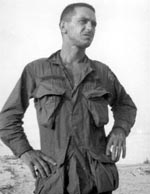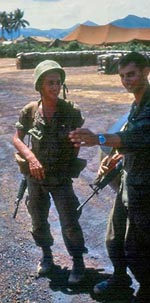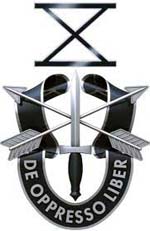
|

|
 | |
|
An up close and personal interview with U.S. Army Veteran and Togetherweserved.com Member:
CPT Jim Schwebach U.S. Army (1964-1975)
PLEASE DESCRIBE WHO OR WHAT INFLUENCED YOUR DECISION TO JOIN THE ARMY?
Growing up my heroes were my Dad's four brothers who were WW II veterans. Two were mud Marines - both Sergeants and both wounded in the Pacific. One was in the Army Finance Corps. The youngest was a crew chief on B-17's over Europe and a career Sr NCO in  the USAF. One of their cousins fought with 1st Special Service Force in Italy and never really came home. They were our family heroes. the USAF. One of their cousins fought with 1st Special Service Force in Italy and never really came home. They were our family heroes.
Later learned that a great uncle, impatient with the USA's position on the War in Europe, had joined the RCAF in 1914 and fought in France from 1915 through the end of the war. After the war he became an engineer and worked on construction projects in South America and the Far East. He died fighting a forest fire in Oregon. He was the adventurer in the family.
These men and the veterans of WW I, WW II and Korea living in our small German community on the edge of the prairie provided the role models that convinced a short, skinny kid to serve his country. At a rare family get together I asked the "boys" for advice. My Marine uncles advised against the Infantry. The Soldier uncle advised against volunteering for anything. And the USAF E-9 (who, he said, had been promoted 15 times in his career) advised joining the Army 'cause promotion was speedier and more permanent. I'd come across a recruiting poster that featured a green beret and under it the words "It says more about you than you'd ever say about yourself." That struck the chord, so in 1963 I wandered on down to the recruiter's office and enlisted for the Army Infantry.
Little Boys on the Prairie photo circa 1947 is me on the railing and Danny on the steps wearing what looks like town clothes.
WHETHER YOU WERE IN THE SERVICE FOR SEVERAL YEARS OR AS A CAREER, PLEASE DESCRIBE THE DIRECTION OR PATH YOU TOOK.
 The path I chose was Infantry and Special Forces operations. As I used to tell folks, being in the Army and not in Combat Arms was like being in the Navy and not on a boat. The path I chose was Infantry and Special Forces operations. As I used to tell folks, being in the Army and not in Combat Arms was like being in the Navy and not on a boat.
As for direction, during the first seven years it was mostly west - A tour on the Zone in Korea and three in the Highlands of SE Asia. The last years were pointed east. Our area of interest was the Middle East and so I learned to speak Arabic and know a lot about sand. That helped later on in my career.
DID YOU PARTICIPATE IN COMBAT OPERATIONS? IF SO, COULD YOU DESCRIBE THOSE WHICH WERE SIGNIFICANT TO YOU?
Although there were no combat operations in Korea while I was there, it was the first place I got seriously shot at by someone I didn't even know. The North Koreans would occasionally fire off a .51 heavy at our positions on the South side of the DMZ. The rule was that for every shot they took at us we could return one using our .50 M2. Kind of like a great big Barrette. There were also patrols into the Zone to check on whether any of the thousands of uncharted mines out there had shifted location over time. Seems the other guys  were interested in the very same thing. It was kind of like playing horseshoes with hand grenades. were interested in the very same thing. It was kind of like playing horseshoes with hand grenades.
As for combat it did get pretty significant east of An Khe the first time I got shot by someone I didn't even know. It was with the 1st Cavalry Division west of the Bong Son Plain. That was my first wound and only spent a few weeks in an in-country hospital. Thanks to Hook Wilson for the six piece care package.
Next time they sent me to Japan by way of the Philippines and Okinawa. After a month or so of duty as a medical training aid in Japan they gave me a choice of going to the States or back to my unit. Not quite of sound mind, I elected to go back to the Cav.
Tet of 68 was significant and busy. By then I was down around Nha Trang and our detachment made a trek into town to help relieve pressure on locations in the city. Found an OCS classmate there, killed and burned in the MACV Compound (I hope it was in that order).
My last trip I was headed for 5th Group again but got diverted to The Americal Division. Seems Maj. Gen. Milloy (lately of the JFKCSW) wanted to build the division's performance level and was going to use SF types to do it. So off I went to the 4th Battalion, 3rd Infantry to get a line company. Joined them in the field and began the conversion from search and avoid to search and destroy. A little later we were securing our remote firebase when at least one NVA regiment tried to secure us. It was another of those significant moments. They had mortars and rockets and sappers. Just like Korea they had .51's.  Difference was they didn't just shoot at us doggies but were distracted by the nice helicopter targets. And we could shoot back at them with anything we had. Was directing fire from the top of the command bunker one day when they started shooting at it with a recoilless rifle. That was real interesting for what seemed like three hours until we got some brand new Cobras to ruin their whole day. They claimed it only took five or ten minutes but it seemed a lot longer. And after that we went back to the woods. A while later the Battalion Commander came back to the hospital in Chu Lai to pin a Purple Heart on my pillow. Difference was they didn't just shoot at us doggies but were distracted by the nice helicopter targets. And we could shoot back at them with anything we had. Was directing fire from the top of the command bunker one day when they started shooting at it with a recoilless rifle. That was real interesting for what seemed like three hours until we got some brand new Cobras to ruin their whole day. They claimed it only took five or ten minutes but it seemed a lot longer. And after that we went back to the woods. A while later the Battalion Commander came back to the hospital in Chu Lai to pin a Purple Heart on my pillow.
When I came back to my company he'd given it to someone else 'cause, as he told me, four Purple Hearts were enough and he was afraid I might get hurt out there. I took over E Company (Mortars, Recon and Radar) and the S-3 Air slot. The new guy really didn't like the woods and the company knew it. After a few weeks the BN XO, an old SF friend, and I kind of convinced the BN CO it would be safer for the troops if we traded places. Again! What a guy!
A month or so later General Milloy swooped in and brought us a new BN CO. And again they took my company away and made me the Battalion Operation Officer (S-3). Serving as the Battalion S-3 for (then) Lt. Col. Phil Grimm was a privilege. I learned more about leadership and war fighting from him than from any other of my military experiences. In terms of enemy casualties and prisoners and weapons captured we soon out performed the rest of the division. More importantly, over the five months I got to work with him we only lost one Soldier and that to helicopter gunfire. We even took the BN CP (That was us, six RTO's and the Recon Platoon) to the woods.  We located and captured a large weapons and supply cache. We located and captured a large weapons and supply cache.
This is Lt. Col. Grimm and I at the weapons and supply cache site. This was a couple days into the BN CP Forward experiment before higher figured out where we were and before the Brigade Commander ordered us back to the hill.
Working with Soldiers in combat at the platoon, company and separate team levels was both significant and most influential in the course of the rest of my professional and personal life.
OF ALL YOUR DUTY STATIONS OR ASSIGNMENTS, WHICH ONE DO YOU HAVE FONDEST MEMORIES OF AND WHY? WHICH ONE WAS YOUR LEAST FAVORITE?
Fondest assignments - Any time they let me lead Soldiers.
Least Fond Assignment - Inventory in the Wound Ward in Japan.
FROM YOUR ENTIRE SERVICE CAREER WHAT PARTICULAR MEMORY STANDS OUT?
During my last tour in RVN the men I worked with in my rifle company took it on themselves and buttonholed our battalion commander to tell him that they thought I should get a medal for an enemy contact they believed was under reported. He agreed and made the recommendation. Brigade started an investigation but it didn't go anywhere.
But the thought that those men believed what had happened was that important humbles me to this day.
IF YOU RECEIVED ANY MEDALS FOR VALOR OR AWARDS FOR SIGNIFICANT ACHIEVEMENT, PLEASE DESCRIBE HOW THESE WERE EARNED.
 The majority of them were the result of standing up when I should have stayed sitting down. The rest just prove that even a blind pig can find an acorn or two. The majority of them were the result of standing up when I should have stayed sitting down. The rest just prove that even a blind pig can find an acorn or two.
OF ALL THE MEDALS, AWARDS, QUALIFICATION BADGES OR DEVICE YOU RECEIVED, PLEASE DESCRIBE THE ONE(S) MOST MEANINGFUL TO YOU AND WHY?
My brother, Paul, served as an Army finance specialist during the Vietnam Era. After his Vietnam tour he was assigned to Oakland Army Terminal where one of his duties was disbursing mustering out pay to troops returning from RVN. Years later he told of paying off a Soldier who asked if he happened to know an officer with the same last name as Paul's. Not knowing quite what to expect, Paul said he did have a brother who'd been with the Cav and was back in country. The man said, "I want you to know that Capt. Schwebach never asked us to do anything he wouldn't do himself." That is the most meaningful citation I've ever received.
WHICH INDIVIDUAL(S) FROM YOUR TIME IN THE MILITARY STAND OUT AS HAVING THE MOST POSITIVE IMPACT ON YOU AND WHY?
SGM Klosinsky, with two combat jumps in Europe, who sponsored me for SF.
ILT John I. Parker who badgered me into applying for OCS.
LTC Philip D Grimm who believed I deserved to be a Regular Army Officer.
COL Art Simons who understood understatement.
CAN YOU RECOUNT A PARTICULAR INCIDENT FROM YOUR SERVICE WHICH MAY OR MAY NOT HAVE BEEN FUNNY AT THE TIME, BUT STILL MAKES YOU LAUGH?
Probably not funny but I still find my failed attempt to return to RVN after the Advanced Course humorous. It used to be that if you graduated as an Honor Graduate from the Infantry Officer's Advanced Course at Benning, you received a nice little statue and the choice of your  next assignment. So when the guy from Infantry Branch asked where I wanted to go, I allowed as how I'd never been in a mechanized unit and such an assignment would be a great use of what I'd recently learned there in the course. He asked if I'd be interested in Europe. So I told him that I understood that the Big Red One was in fact a mechanized division and that was my first choice. No problem, he said, that was where I would go after Nuke School. Apparently he wasn't too good at geography because a couple of weeks later I get a call from Branch. It's a Colonel and he's calling to ask me if I know where the 1st Infantry Division is. I told him I thought it was Northwest of Saigon somewhere. At which point he got a little testy and explained that since I'd already been in country a time or two and that I'd been clumsy enough to get scratched up a little here and there and that my sainted mother had had three of her sons over there for a total of five years there was no way the Army was going to let me go back and get seriously killed or injured. I told him that we had only been over there a little over three years because my brothers had served their tours almost concurrently with mine. That may have been what prompted the Colonel to let me know I'd used up my assignment choice and the Army would send me off to wherever it wanted to. So it did. Now I wish I would have asked him how Branch had lost track of an entire Division. I've never been to Greenland. next assignment. So when the guy from Infantry Branch asked where I wanted to go, I allowed as how I'd never been in a mechanized unit and such an assignment would be a great use of what I'd recently learned there in the course. He asked if I'd be interested in Europe. So I told him that I understood that the Big Red One was in fact a mechanized division and that was my first choice. No problem, he said, that was where I would go after Nuke School. Apparently he wasn't too good at geography because a couple of weeks later I get a call from Branch. It's a Colonel and he's calling to ask me if I know where the 1st Infantry Division is. I told him I thought it was Northwest of Saigon somewhere. At which point he got a little testy and explained that since I'd already been in country a time or two and that I'd been clumsy enough to get scratched up a little here and there and that my sainted mother had had three of her sons over there for a total of five years there was no way the Army was going to let me go back and get seriously killed or injured. I told him that we had only been over there a little over three years because my brothers had served their tours almost concurrently with mine. That may have been what prompted the Colonel to let me know I'd used up my assignment choice and the Army would send me off to wherever it wanted to. So it did. Now I wish I would have asked him how Branch had lost track of an entire Division. I've never been to Greenland.
WHAT PROFESSION DID YOU FOLLOW AFTER YOUR MILITARY SERVICE AND WHAT ARE YOU DOING NOW? IF YOU ARE CURRENTLY SERVING, WHAT IS YOUR PRESENT OCCUPATIONAL SPECIALTY?
After leaving the Army I did a little contract work, finished a degree in business and went to work at EDS where I did some system design, development and implementation. My work took me all over the States, Europe and the Middle East. Lived in Iran until the revolution got  serious then got involved in a project involving moving some EDS employees out of Iran. I finished up my career with EDS doing group and regional management and retired from EDS in 1999. serious then got involved in a project involving moving some EDS employees out of Iran. I finished up my career with EDS doing group and regional management and retired from EDS in 1999.
After retiring I built a national award winning custom pickup, and one or two street rods. Through doing car shows I got involved in promoting fund raising events for the MDA. Our best year we netted over thirty thousand dollars for Jerry's kids.
An old buddy from EDS asked me if I'd be interested in Habitat for Humanity. Since I'd figured out that you hit the flat end if the nail I agreed. I worked on a couple of dozen houses and somehow ended up on the board of directors.
Long about 2005, I was asked to participate in a veteran's panel as part of a retreat for returning veterans and their spouses who were having difficulty adjusting to one another after their combat tours and ended up being full time staff. We did sixteen retreats for couples from all over the States over the next couple of years.
Nowadays I live on the end of a ridge here in North Texas with my new bride, spoil our 'grandurchins' then send them home, feed the donkeys and watch cows turn grass into calves.
WHAT MILITARY ASSOCIATIONS ARE YOU A MEMBER OF, IF ANY? WHAT SPECIFIC BENEFITS DO YOU DERIVE FROM YOUR MEMBERSHIPS?
Over time I've joined one or two of these groups but am no longer active as the cliques and politics are not exactly my style.
The exception has been the SF Association, except that the nearest chapter is a couple of hours away. That cuts down on participation just a hair.
IN WHAT WAYS HAS SERVING IN THE MILITARY INFLUENCED THE WAY YOU HAVE APPROACHED YOUR LIFE AND YOUR CAREER?
 Serving taught me that 99.99% of people are good and that you cannot bullshit the troops. Serving taught me that 99.99% of people are good and that you cannot bullshit the troops.
And that if you believe you can, you will. I'm not exactly what you'd call a giant, either physically or mentally but still managed to get through some pretty demanding training: Jump school (then a 30% drop rate), OCS (our class graduated 50%), SF selection (about 20% got a hat), Ranger School (only 40% of us received our tabs), less than 10% of our advanced got selected for prefix 5 training and not all of those selected made it through the course. I don't have the numbers but not every one makes it through Arabic either. Somewhere along the line I figured out that the Army doesn't run training so it can fail Soldiers. So if they let you in you can make it. And if you can make it there you can make it anywhere. (New York! New York!)
And I learned General Eisenhower was right--you cannot push a string.
BASED ON YOUR OWN EXPERIENCES, WHAT ADVICE WOULD YOU GIVE TO THOSE WHO HAVE RECENTLY JOINED THE ARMY?
First of all, believe in your people and believe in yourself.
There's something to learn from everybody.
Those who join today are beginning a career where initiative is the key. You have to make your career happen. Figure what you want to be, find out what you need to get there,  make a plan and get on with it. make a plan and get on with it.
Let your leadership know what your objectives are. Good leaders take pride in developing their people but they need to know what that means.
IN WHAT WAYS HAS TOGETHERWESERVED.COM HELPED YOU REMEMBER YOUR MILITARY SERVICE AND THE FRIENDS YOU SERVED WITH.
The format here provides an excellent outline in which to organize thoughts and experiences. Seeing and reading the experiences of other veterans provides perspective. Putting it all together shows how much you have to be quiet about.
| |
|
Share this Voices Edition on:



 |
|
TWS VOICES
TWS Voices are the personal stories of men and women who served in the US Military and convey how serving their Country has made a positive impact on their lives. If you would like to participate in a future edition of Voices, or know someone who might be interested, please contact TWS Voices HERE.
This edition of Army Voices was supported by:
Army.Togetherweserved.com
For current and former serving Members of the US Army, US Army Reserve and US Army National Guard, TogetherWeServed.com is a unique, feature rich resource helping Soldiers re-connect with lost Brothers, share memories and tell their Army story.
To join Army.Togetherweserved.com, please click HERE.
| |